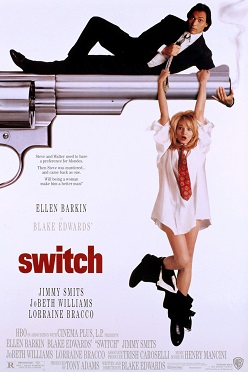Plot
Ad man Steve Brooks — a promiscuous misogynist and quintessential chauvinist — is invited to a deadly surprise party by three former lovers. Margo Bronfman, Liz and Felicia try to drown him in the hot tub. When that fails, Margo shoots him point blank in the chest, killing him.
In purgatory, God (communicating through male and female voices) gives Steve one chance at redemption. He is returned to Earth, alive, and told that he must find a soulmate, a female who truly loves him. If he fails, he will go to Hell.
The Devil convinces God to give Steve a challenge, taking his notorious charm into account, and Steve is transformed into a beautiful woman, Amanda. Amanda goes to Margo, convinces her that she is Steve and persuades her to give her lessons in being a woman.
Telling everyone that Steve has run off and that she is his half-sister, Amanda moves into Steve's life, convincing his boss at the advertising agency, Arnold Friedkin, to give her Steve's job, which partly involves getting a plum account with lesbian cosmetics magnate Sheila Faxton.
Amanda tries to use her new female body as a weapon in her campaign to get the account and to win a woman's love. Sheila responds, but Amanda balks on following through on the seduction. Margo reminds her that homophobia was one of the traits that made Steve so hateful. Amanda breaks up with Sheila, telling her that the romance was contrived to get her as a client. The agency keeps the account but Sheila is furious at Amanda.
When Amanda prays to God for help, the Devil offers her a job with his operation. She refuses and calls all the names in Steve's address book, hoping to find a woman who has something kind to say about him. Instead she discovers just how hated Steve is, and how deeply she, when Steve, damaged countless women. In the course of the film, Amanda also begins to understand how women live and resent the way men — including herself when Steve — perversely treat them.
Steve's best friend, Walter Stone, has been attracted to Amanda from their first meeting and, when despair sends her on a bender, he joins her. They get drunk together and Amanda convinces Walter that she is Steve. One night after a bar fight, they both get drunk and fall asleep in the same bed.
In the morning, Amanda has no memory of the encounter and accuses Walter of raping her while she was passed out — the same thing Steve himself would have done. He is astonished, insisting that she was not only awake but an enthusiastic participant. Amanda recognizes the difference between the man she used to be as Steve and the far better man that Walter is.
Meanwhile, Steve's body has been found in the river and Margo plants her gun in Amanda's sofa, framing her for the crime. When Amanda is found psychologically unfit for trial, she is committed to the mental hospital, where she learns she is pregnant with Walter's child. There are dangerous complications, but she insists on carrying the baby to term. Walter proposes, and Amanda reluctantly accepts: they are married. Months pass, and with Walter beside her, Amanda gives birth to a baby girl. The newborn infant gazes at her mother with love, and Amanda dies, having earned a place in Heaven.
Upon arriving in Heaven, Amanda must decide whether to spend eternity as a male or a female angel. She finds the decision difficult, especially after, five years later, she watches as Walter and their daughter bring flowers to her grave. God, in their dual voices, reassures Amanda that she has all eternity to decide.
